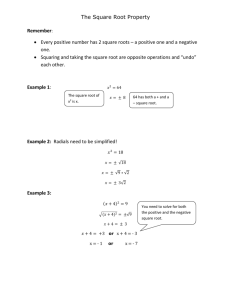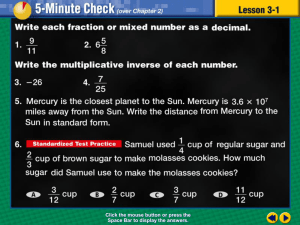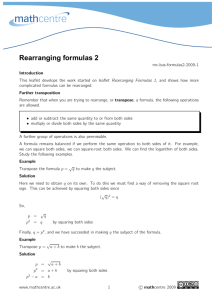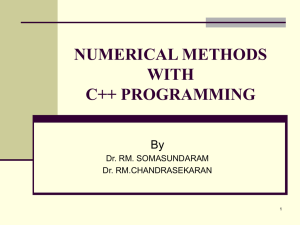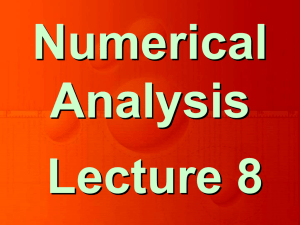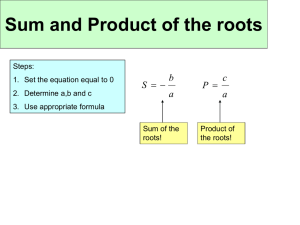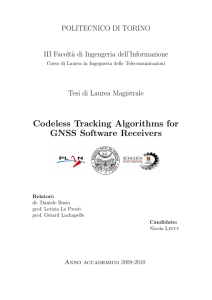Surds equation
advertisement
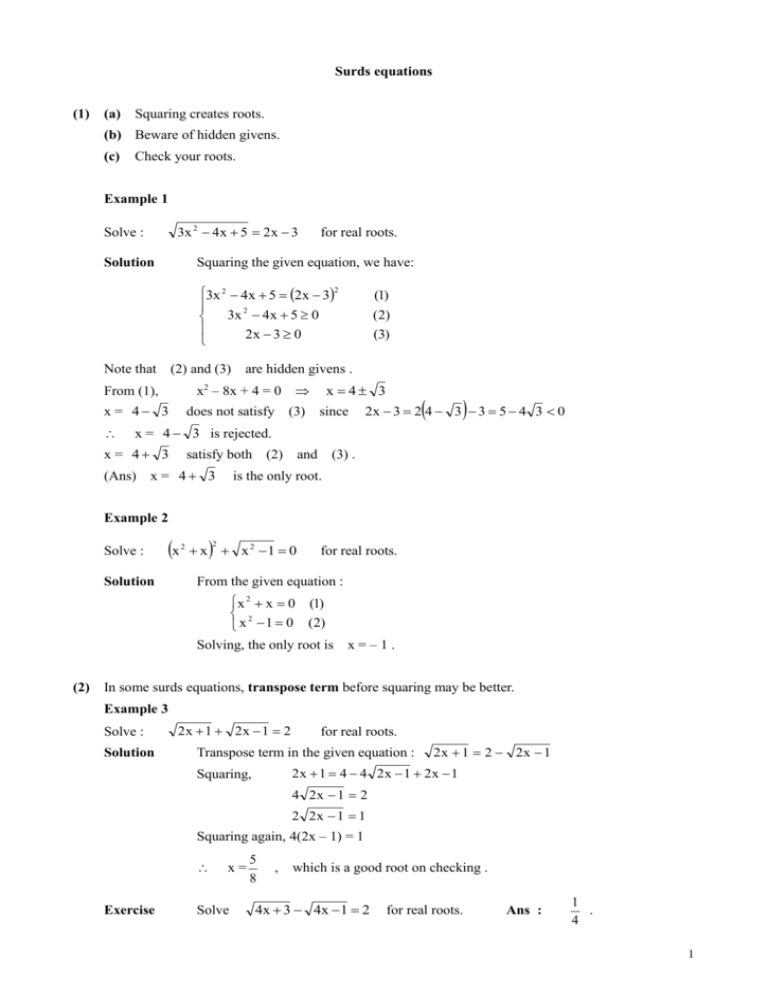
Surds equations Yue Kwok Choy (1) (a) Squaring creates roots. (b) Beware of hidden givens. (c) Check your roots. Example 1 3x 2 4 x 5 2 x 3 Solve : Solution for real roots. Squaring the given equation, we have: 3x 2 4x 5 2x 32 2 3x 4x 5 0 2x 3 0 Note that (2) and (3) x = 4 3 are hidden givens . x2 – 8x + 4 = 0 From (1), (1) (2) (3) does not satisfy (3) x 4 3 since 2x 3 2 4 3 3 5 4 3 0 x = 4 3 is rejected. x = 4 3 satisfy both (2) and (3) . (Ans) x = 4 3 is the only root. Example 2 Solve : x Solution 2 2 x x 2 1 0 for real roots. From the given equation : x 2 x 0 (1) 2 x 1 0 (2) Solving, the only root is x = – 1 . (2) In some surds equations, transpose term before squaring may be better. Example 3 Solve : Solution 2x 1 2x 1 2 for real roots. Transpose term in the given equation : 2x 1 2 2x 1 2x 1 4 4 2x 1 2x 1 Squaring, 4 2x 1 2 2 2x 1 1 Squaring again, 4(2x – 1) = 1 Exercise x= Solve 5 8 , which is a good root on checking . 4x 3 4x 1 2 for real roots. Ans : 1 . 4 1 Example 4 Solve : Solution 5x 1 x 2 for real roots. Transpose term in the given equation : 5x 1 2 x . Squaring, 5x 1 x 4 x 4 4 x 4x 3 16x = 16x2 – 24x + 9 Squaring again, 16x2 – 40x + 9 = 0 (4x – 9) (4x – 1) = 0 (3) x 1 1 2x 1 Solve 9 4 1 4 or 1 is a redundant root and should be rejected. 4 On checking, x Exercise x for real roots. Ans : x 9 4 2 7 1 9 Conjugate method Example 4 Solve : 3x 4 3x 6 10 Solution Let for real roots. 3x 4 3x 6 10 …. (1) 3x 4 3x 6 y …. (2) 3x 4 3x 6 10 y (1)(2), y=1. 3x 4 3x 6 1 From (2), (1) + (3), 2 3x 4 11 Squaring, 4(3x + 4) = 121 x= 35 . 4 …. (3) (on checking, this is a good root) Example 5 Solve : x 2 3x 7 x 2 3x 9 2 Solution Let for real roots. x 2 3x 7 x 2 3x 9 2 …. (1) x 2 3x 7 x 2 3x 9 y …. (2) x (1)(2), From (2), [(1) + (3)]/2, 2 3x 7 x 2 3x 9 2y y=8. x 2 3x 7 x 2 3x 9 8 x 2 3x 7 = 5 Squaring and simplify, …. (3) …. (4) x2 + 3x – 18 = 0 2 (x – 3) (x + 6) = 0 x=3,–6 Since both sides of (4) are positive, we do not have any redundant root on squaring. Exercise (4) x 2 4x 34 x 2 4x 11 9 Solve for real roots. Ans : 3, 5 3 Change of variables Example 6 Solve : x 2 2x 2x 2 4x 3 for real roots. Solution x 2 2x 2x 2 4x 3 Put then …. (1) …. (2) y = x2 – 2x 2x 4x 3 = 2y + 3 2 The given equation then becomes Squaring , y2 – 2y – 3 = 0, y 2y 3 …. (3) (y – 3)(y + 1) = 0 Since from (3), y 0, y + 1 0, y=3 2 (4)(2), x – 2x – 3 = 0 , (x – 3)(x + 1) = 0 x = 3, –1 . …. (4) Example 7 Solve : Solution x 2 x k 2 1 , where Let k is a constant . u x 2 0 v x k 2 0 Then the given equation becomes u v 1 : 2 2 u v k u v 1 u u v 1 u v u v k u v k v Since therefore Exercise Solve x 1 1 k 1 0, 2 1 k 1 2 1 k 1 2 x k 1 1 k 1 0 2 1 x k 12 2 , when k 1 4 , when k 1 no solution x 1 x 1 1 x Ans: x 1 5 2 3 4
